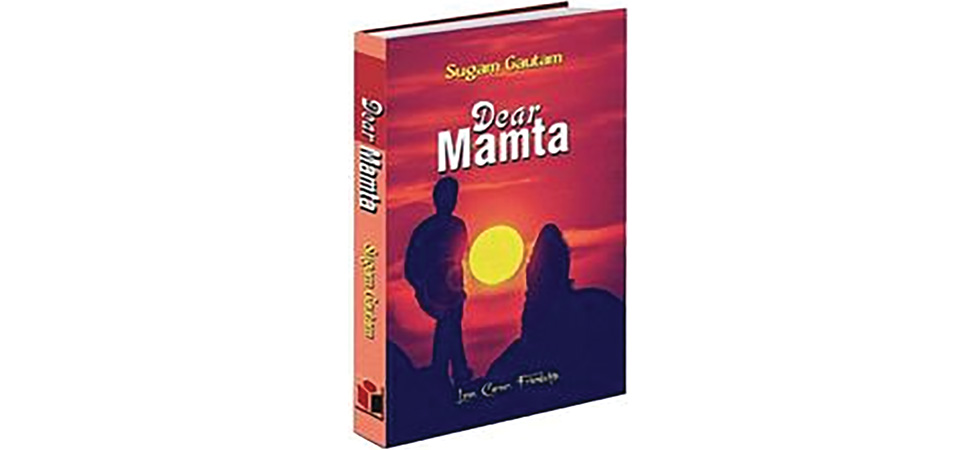A novel Of Love, Career And Friendship

Sushant Thapa
Choosing between career and love can be a tough choice for youngsters. Dear Mamta, the novel penned by Mr Sugam Gautam, begins with such a conflict. At the beginning of the novel, the writer appears to be optimistic in his presentation.
Sugam's philosophy enhances his quality as a writer of intellect. Dear Mamta poses some of the questions regarding our Nepalese society. How a good career and good caste go hand in hand is one of the issues which the novel delves into, love being the driving force. The female protagonist, Mamta, is a so-called lower caste girl and Pawan is a so-called higher caste boy. Even if they have a promising career, their caste causes problems and society is less likely to accept their bonding. There is a hint in the novel toward this ambiguity.
In the novel, Mr Sugam mentions the earthquake. Nepalese society has not forgotten the earthquake of April 2015. This mention of an earthquake in the plot of the Novel makes the novel more social in its acceptance, the pangs of this natural calamity still haunt many families. There is a recollection of the 1990 earthquake from the history in the story. Life has to be lived among all the conflicts and mishaps. Dear Mamta captures our thoughts through Pawan's mental map and feelings for his girlfriend. Dear Mamta is about life as much as it is about love. The friendship between Shrawan (Fatso) and Pawan forms a good part of the story. The plot of the novel truly revolves around Love, Career and Friendship. We also get acquainted with parental love and care.
The context of love, marriage and caste makes this novel more social. Mr Gautam introduces us to characters like Neha and her father Shriram who is a friend of Pawan's dad. These characters bring stories about the caste divide and higher caste consciousness which is easily accepted by society. How content and happy people are with same caste marriage is shown in the novel, people do differentiate and they judge with the lens of caste.
From a story of a family living in Pokhara and running a shop, this novel is also about individualism. We have individualism and familial perspectives in the novel. the Differences between a lavish family (Shrawan's family) and a mediocre family (Pawan's family) is to be noted in the novel. Pawan's journey as a student is a part of individualism. Detachment is also a theme for the novel. Detaching from Pokhara to Kathmandu for studying and also detaching from a beloved leaves Pawan despondent. The story represents Pawan's life closely and the ups and downs of Pawan's individual life. We get to learn a lot from characters who are close to Pawan's life. Dear Mamta is as much about Mamta as it is about Pawan. Her need as a remarkable character is not overshadowed in the novel. The relationship between Pawan and Mamta builds the narration in the novel. The conflict lies in restless Pawan when he tries to contact Mamta after the Earthquake. The backwards shift of time in the Novel also excellently introduces and portrays Mamta as a character.
I would not want to delve deeper into the plot of the novel. I suggest readers go through this novel. The language is to the point and the correct use of vocabulary make the read thrilling. Dear Mamta is an excellent piece of art. In the end, Pawan does not succeed in marrying Mamta, but we as a reader are blessed with this crafty narrative. Dear Mamta will interest the readers. It is contemporary, relatable and exemplary with a good flow of language.
"Love is an emotion that keeps you in a dilemma unless expressed". Here I quote a line from the book. This line is from the context when Pawan Baral and Mamta Sunar express their love in words for the first time in the novel. This should raise curiosity in readers to read the complete novel. It is one of the definitions of love that Mr Gautam describes in his novel.
Changes should begin from family and not society. Mr Gautam hints at us with this thought regarding inter-caste marriage. The novel tells us how Nepalese society is still stuck with caste discrimination. The novel completely showcases that throughout the narrative.
Recent News

Do not make expressions casting dout on election: EC
14 Apr, 2022
CM Bhatta says may New Year 2079 BS inspire positive thinking
14 Apr, 2022
Three new cases, 44 recoveries in 24 hours
14 Apr, 2022
689 climbers of 84 teams so far acquire permits for climbing various peaks this spring season
14 Apr, 2022
How the rising cost of living crisis is impacting Nepal
14 Apr, 2022
US military confirms an interstellar meteor collided with Earth
14 Apr, 2022
Valneva Covid vaccine approved for use in UK
14 Apr, 2022
Chair Prachanda highlights need of unity among Maoist, Communist forces
14 Apr, 2022
Ranbir Kapoor and Alia Bhatt: Bollywood toasts star couple on wedding
14 Apr, 2022
President Bhandari confers decorations (Photo Feature)
14 Apr, 2022











